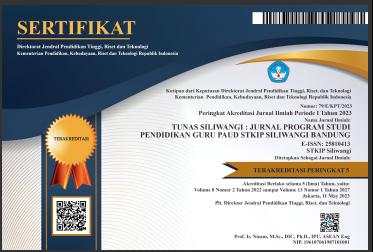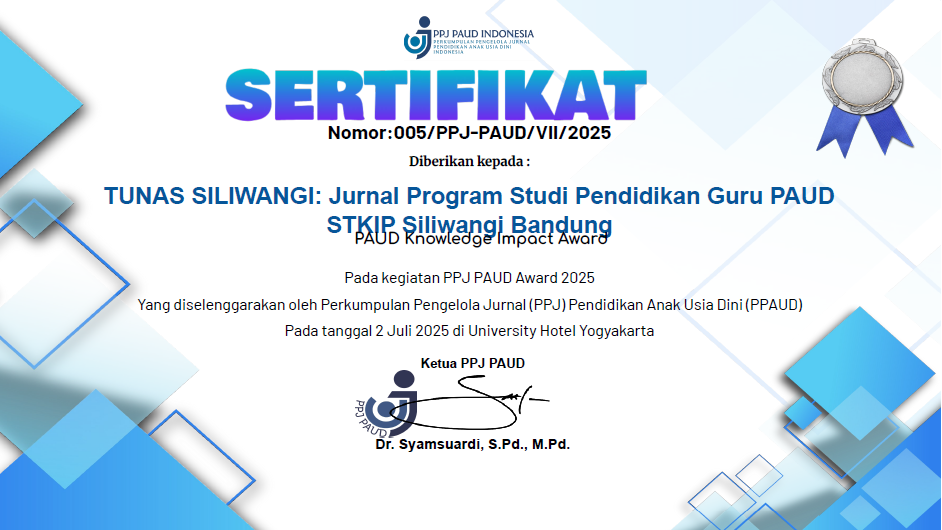How daycare develops self-confidence in young children
DOI:
https://doi.org/10.22460/ts.v11i2.6267Keywords:
Daycare, Self-confidence, Early ChildhoodAbstract
Self-confidence plays an important role in children's lives because it allows them to be creative according to their talents and abilities in solving problems and improving their quality of life. The study was conducted at a daycare center in Bandung with six participants, namely three caregivers and three parents who had entrusted their children to the center for more than a year. The method used was descriptive qualitative with interview techniques, direct observation, and documentation, and validated through triangulation. The results showed that children's self-confidence developed through consistent routines, play-based learning, and structured activities such as art, music, and outings. Positive reinforcement from caregivers and parental support play an important role in encouraging children to express themselves. This study concludes that collaboration between parents and caregivers is very important in building the self-confidence of early childhood
References
Anggraeni, M. A. (2017). Penerapan Bermain Untuk Membangun Rasa Percaya Diri Anak Usia Dini. Journal Of Early Childhood and Inclusive Education, 1(1).
Budyawati, L. P. I., Atika, A. N., Yuniarta Syarifatul Umami, Muhammad Haidlor, & Ahmad Afandi. (2023). Working Parents’ Needs for Early Childhood Daycare. Jurnal Pendidikan Anak Usia Dini Undiksha, 11(2), 284–292. https://doi.org/10.23887/paud.v11i2.54883
Erikson, E. H. (2009). Identity and the Life Cycle. Norton & Company.
Kamaruddin, I., Tabroni, I., & Azizah, M. (2022). Konsep Pengembangan Self-Esteem Pada Anak Untuk Membangun Kepercayaan Diri Sejak Dini. Al-Madrasah: Jurnal Pendidikan Madrasah Ibtidaiyah, 6(3), 496. https://doi.org/10.35931/am.v6i3.1015
Kim, M., Jung, N., & Wulandari, L. (2022). Parenting in a 24/7 Economy: Mothers’ Non-standard Work Schedules and Involvement in Children’s Education. Frontiers in Psychology, 13. https://doi.org/10.3389/fpsyg.2022.905226
Kurniasih, K., Supena, A., & Nurani, Y. (2021). Peningkatan Kepercayaan Diri Anak Usia Dini melalui Kegiatan Jurnal Pagi. Jurnal Obsesi : Jurnal Pendidikan Anak Usia Dini, 5(2), 2250–2258. https://doi.org/10.31004/obsesi.v5i2.1109
Masruroh, L. (2020). Identifikasi Nilai Karakter Pada Anak Usia Dini Di PAUD Cikal Karangempel. 3(2). https://al-afkar.com/index.php/Afkar_Journal/issue/view/4
Nazir, M. (2005). Metode Penelitian . Ghaila Indonesia.
Rijkiyani, R. P., Syarifuddin, S., & Mauizdati, N. (2022). Peran Orang Tua dalam Mengembangkan Potensi Anak pada Masa Golden Age. Jurnal Basicedu, 6(3), 4905–4912. https://doi.org/10.31004/basicedu.v6i3.2986
Sari, D. R., & Rosyidah, A. Z. (2019). Peran Orang Tua Pada Kemandirian Anak Usia Dini. Jurnal Pendidikan : Early Childhood, 3(1).
Sugiono. (2018). Metode Penelitian Kualitatif, Kuantitaif, R&D. Alfa-Beta.
Susanti, veti, & Shomedran. (2023). Penanaman Sikap Sosial Anak di Taman Penitipan Anak (TPA) Robbani Indralaya Utara. Aulad : Journal on Early Childhood, 6(2), 182–187. https://doi.org/10.31004/aulad.v6i1.454
Wulandari, A. A. (2020). Implementation of the 2013 Curriculum Based on a Scientific Approach (Case Study at SD Cluster II Kintamani). International Journal of Elementary Education, 4(3), 422–430. https://ejournal.undiksha.ac.id/index.php/IJEE
Downloads
Published
Issue
Section
License
Copyright (c) 2025 Ismi Aziza, Aan Listiana, Ernawulan Syaodih

This work is licensed under a Creative Commons Attribution-ShareAlike 4.0 International License.
The author is responsible for acquiring the permission(s) to reproduce any copyrighted figures, tables, data, or text that are being used in the submitted paper. Authors should note that text quotations of more than 250 words from a published or copyrighted work will require grant of permission from the original publisher to reprint. The written permission letter(s) must be submitted together with the manuscript.







